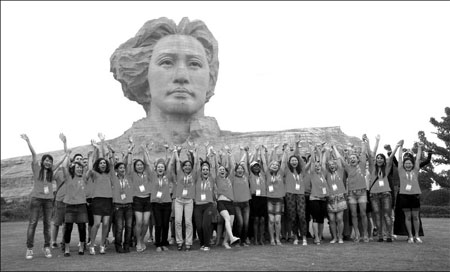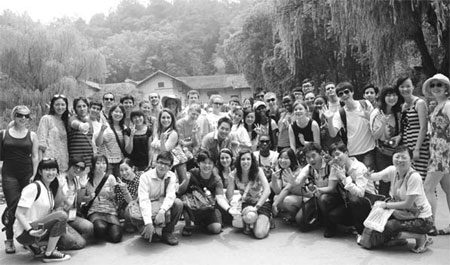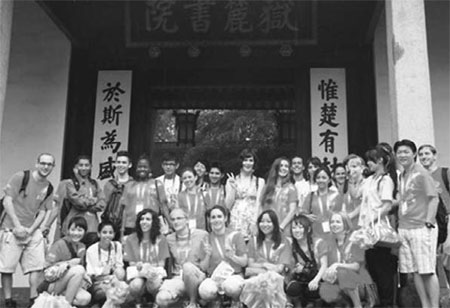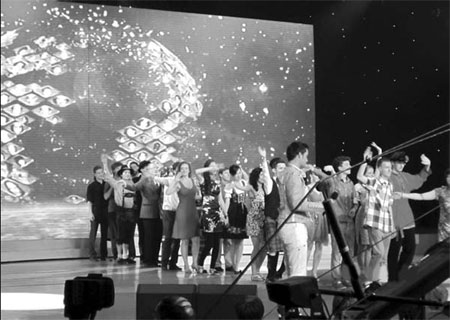Contest to find champions in Chinese
Updated: 2011-08-05 07:58
By Feng Zhiwei (China Daily)
|
|||||||||||
|
Competitors in front of a sculpture of youthful Mao Zedong on Orange Island in the Xiangjang River that runs through Changsha. Photos Provided to China Daily |
|
Finalists in the Chinese Bridge competition toured Shaoshan, hometown of Chairman Mao. |
|
The millenium-old Yuelu Academy is a center for the study of Hunan culture and the Lixue School of Confucianism. |
|
The opening ceremony for the competition was held on July 16 in Changsha. |
International finalists are ready in Hunan, also learn of province's prominence
After winning preliminary rounds of the language competition Chinese Bridge in their home countries, 118 foreign university students from 60 nations arrived on July 13 for the finals in Central China's Hunan province.
The event is sponsored by Hanban, a national organization for the promotion of Chinese language and culture among foreigners.
The finals in Hunan's capital Changsha mark completion of the 10th year of the competition.
But before contestants start their final contest this weekend, they had enough time for relaxing tours of Hunan, a province that produced a number of prominent figures that helped shape the modern history of China.
Students arrived at Hanban headquarters in Beijing on July 10 and then went on to Hunan, divided into three groups, and visited Zhangjiajie, Yueyang, and Changsha along with neighboring cities.
Hunan, a region of brilliant cultures and beautiful scenery, is also the home province of many founders of New China including Mao Zedong and Liu Shaoqi.
The tours helped provide students with an answer to why the Hunanese played such a pioneering role in promoting social progress in China.
In Yueyang, a city in north Hunan, students climbed up Yueyang Tower to have a view of Dongting Lake - once the largest and now the third-biggest lake in the country.
Enlightening tours
They not only enjoyed the grand landscape, but also learned about the formation of a culture that has influenced the Hunan people for a millennium.
A thousand years ago, Fan Zhongyan - one of the greatest statesmen and Confucian scholars during the Song Dynasty (960-1279) - visited his friend Teng Zijing in Yueyang.
At the time, Teng had been banished from the imperial court and sent to govern the Yueyang region.
The two friends visited Yueyang Tower, and Fan - inspired by the boundless Dongting - wrote an essay that has been included in textbooks for many generations.
In the work, Fan suggests his friend should have a heart and soul as broad as the large lake. He goes on to discuss the responsibilities of politicians and intellectuals, saying that "they should be the first to worry for the future of the state and people and the last to claim a share of happiness".
A sense of responsibility unique to the area's culture was born. Local scholars then formed the Lixue School of Confucianism that gives prominence to social progress rather than academic research.
Numerous Hunanese have since devoted themselves to social reform, especially in the past century.
Notable native sons include Tan Sitong, among the first to advocate establishment of a constitutional nation during the late Qing Dynasty (1644-1911), as well as democratic forefathers Huang Xing, Cai E and Song Jiaoren, who were later followed by the founders of New China.
In Changsha, students visited Yuelu Academy - the nation's only Confucian academy in continuous operation for the past thousand years - and the cradle of the Lixue School and study of Hunan culture.
Foreign students also visited the sites where Mao Zedong and his comrades started their revolutionary careers.
They had a tour of Mao's hometown Shaoshan - visiting the plain brick house and village surrounded by mountains - which nurtured a great figure who bore great responsibility even during childhood.
Ethnic cultures
While two student groups studied mainstream Hunan culture in the north and center of the province, another group headed to Zhangjiajie in the northwest.
The region's dense forests, high mountains and mysterious caves help make it the largest tourism destination in Hunan.
But their primary task was to find the ethnic cultures that also contributed greatly to the collective personality of the Hunan people.
Zhangjiajie is home to Tujia and Miao people who have long lived in a harsh environment that engendered a tough and brave people with an enterprising spirit and great endurance.
Through centuries of integration, they injected fresh energy into Hunan culture, making the people more steadfast in their ideals and more preserving in times of hardship.
Those characteristics helped the Hunanese make a renowned contribution to fighting the Japanese invasion of the 1930s and 1940s.
In addition to studying local cultures, the students also interacted with the common people to learn about their present way of living, their feelings and their dreams.
After more than 20 days of study tours, the foreign students are now ready for their final competition this weekend.
The finals include tests of Chinese language skills and knowledge about China's people, life and culture.
Winners of the competition will be announced at the closing ceremony on August 8. Awards include scholarships to study at China's renowned universities and colleges.
(China Daily 08/05/2011 page14)



